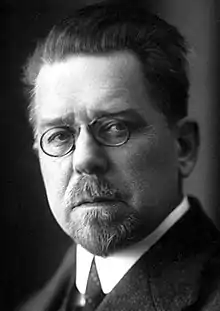1924 Nobel Prize in Literature
The 1924 Nobel Prize in Literature was awarded to the Polish author Wladyslaw Reymont "for his great national epic, The Peasants".[1]
| Wladyslaw Reymont | |
 "for his great national epic, The Peasants" | |
| Date |
|
| Location | Stockholm, Sweden |
| Presented by | Swedish Academy |
| First awarded | 1901 |
| Website | Official website |
Laureate
Wladyslaw Stanislaw Reymont (1867-1925) wrote novels and short stories that was strongly influenced by naturalism. He is best known for Chłopi (1904-1909, The Peasants), a novel in four volumes that chronicles peasant life in Poland during the four seasons of the year, for which he specifically was awarded the Nobel prize. An earlier success was the novel Ziemia obiecana (The Promised Land, 1899).[2]
Nominations
Wladislaw Reymont was nominated four times (1919, 1920, 1922 and 1924) before he was awarded in 1924.[3] Other nominated authors in 1924 included Hugo von Hofmannsthal, Guglielmo Ferrero, Thomas Hardy, Paul Ernst, Stefan Zeromski, Roberto Bracco, Paul Sabatier, Olav Duun, George Bernard Shaw (awarded in 1925), Grazia Deledda (awarded in 1926) and Thomas Mann (awarded in 1929).[4]
| No. | Nominee | Country | Genre(s) | Nominator(s) |
|---|---|---|---|---|
| 1 | Thomas Hardy (1840–1928) | novel, short story, poetry, drama | Robert Eugen Zachrisson (1880–1937) | |
| 2 | Thomas Mann (1875–1955) | novel, short story, drama, essays | ||
| 3 | Władysław Reymont (1867–1925) | novel, short story | Anders Österling (1884–1981) | |
Presentation
As no official award ceremony took place, Per Hallström, chairman of the Nobel committee of the Swedish Academy, wrote a critical essay on Reymont in lieu of a presentation speech. In it he concluded:
To sum up, this epic novel is characterized by an art so grand, so sure, so powerful, that we may predict a lasting value and rank for it, not only within Polish literature but also within the whole of that branch of imaginative writing which has here been given a distinctive and monumental shape.[5]
References
- The Nobel Prize in Literature 1924 nobelprize.org
- "Wladislaw Stanislaw Reymont". britannica.com.
- "Nomination archive - Wladislaw S Reymont". nobelprize.org.
- "Nomination archive - Literature 1924". nobelprize.org.
- "Presentation". nobelprize.org.
External links
- Presentation A critical essay by Per Hallström, chairman of the Nobel committee of the Swedish Academy